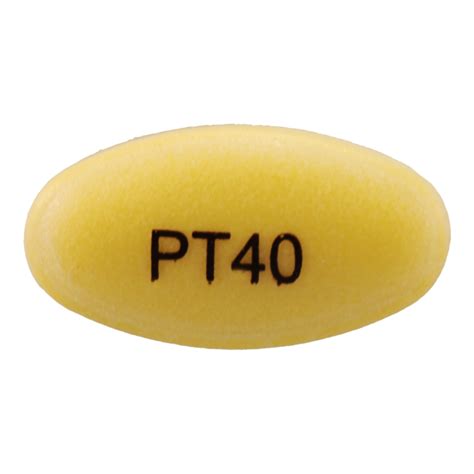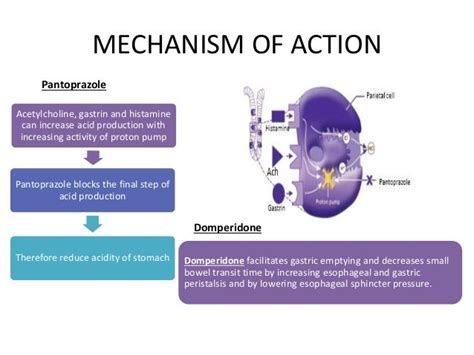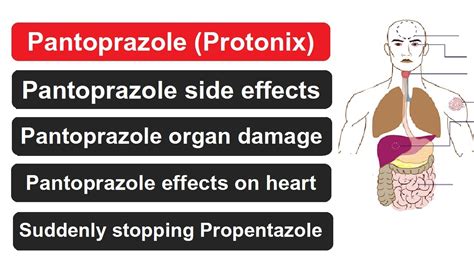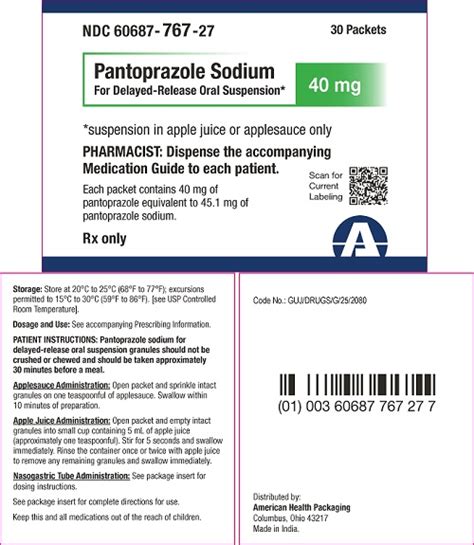Intro
Discover the uses, side effects, and interactions of Pantoprazole 40mg, a proton pump inhibitor medication, for acid reflux and stomach ulcers treatment, dosage, and warnings.
Pantoprazole is a widely used medication that belongs to the class of proton pump inhibitors (PPIs). It is primarily prescribed to treat various conditions related to excessive stomach acid production. Understanding the proper use, benefits, and potential side effects of pantoprazole 40mg is crucial for patients who are about to start their treatment. This medication guide aims to provide comprehensive information about pantoprazole, helping patients make informed decisions about their health.
The importance of managing stomach acid cannot be overstated. Excessive acid production can lead to discomfort, pain, and complications such as gastroesophageal reflux disease (GERD), stomach ulcers, and Zollinger-Ellison syndrome. Pantoprazole works by reducing the amount of acid produced by the stomach, thereby alleviating symptoms and facilitating healing. Its effectiveness has made it a preferred choice among healthcare providers for treating acid-related disorders.
Pantoprazole's mechanism of action is straightforward yet effective. It inhibits the H+/K+ ATPase (proton pump) in the stomach lining, which is responsible for the final step of acid production. By blocking this enzyme, pantoprazole significantly decreases gastric acid secretion. This reduction in acid production helps in healing and preventing ulcers in the stomach and intestines, and it also provides relief from symptoms of acid reflux and heartburn.
Introduction to Pantoprazole 40mg

Pantoprazole 40mg is available in the form of delayed-release tablets or oral suspension. The standard dosage for adults with gastroesophageal reflux disease (GERD) and erosive esophagitis is 40mg once daily for up to 8 weeks. For the treatment of Zollinger-Ellison syndrome, the dosage might be higher and is adjusted based on the patient's response to the treatment. It is essential to follow the doctor's prescription and not to exceed the recommended dose without consultation.
Benefits of Pantoprazole 40mg
The benefits of pantoprazole 40mg are numerous and well-documented. It provides effective relief from symptoms of GERD, such as heartburn and regurgitation, and facilitates the healing of esophagitis. For patients with peptic ulcer disease, pantoprazole accelerates the healing process and reduces the risk of ulcer recurrence. Its ability to control acid production also makes it beneficial for patients with Zollinger-Ellison syndrome, a rare disorder characterized by excessive gastric acid secretion.Working Mechanism of Pantoprazole

Understanding how pantoprazole works is crucial for appreciating its therapeutic effects. The drug is absorbed into the bloodstream after oral administration and then accumulates in the canaliculi of the parietal cells in the stomach. Here, it is activated at the low pH of the canaliculi, where it irreversibly inhibits the H+/K+ ATPase enzyme, effectively blocking the final step of acid production. This irreversible inhibition means that new proton pumps must be produced before acid secretion can resume, allowing for a prolonged duration of action.
Steps for Taking Pantoprazole 40mg
To ensure the maximum effectiveness of pantoprazole 40mg, patients should follow these steps: - Take the medication exactly as prescribed by the doctor. - Swallow the tablets whole with water; do not chew or crush them. - If using the oral suspension, follow the instructions provided with the medication for the correct method of administration. - Take pantoprazole at the same time each day to maintain consistent drug levels. - Continue the treatment for the full prescribed duration, even if symptoms improve before the end of the treatment period.Potential Side Effects of Pantoprazole 40mg

While pantoprazole 40mg is generally well-tolerated, it can cause side effects in some patients. Common side effects include headache, diarrhea, nausea, and vomiting. Less common but more serious side effects can include severe allergic reactions, bone fractures, and vitamin B12 deficiency, especially with long-term use. Patients should report any side effects to their healthcare provider, as they may need to adjust the treatment plan.
Precautions and Warnings
Pantoprazole 40mg is contraindicated in patients with known hypersensitivity to the drug or any of its components. It is also not recommended for patients with severe liver impairment. Pregnant women should use pantoprazole only if clearly needed, and breastfeeding mothers should consult their doctor before starting the treatment. Patients should also be aware of potential drug interactions, especially with clopidogrel, warfarin, and methotrexate, as pantoprazole can affect their efficacy or increase the risk of side effects.Practical Examples and Statistical Data

Numerous studies have demonstrated the efficacy and safety of pantoprazole 40mg. For instance, in a clinical trial involving patients with erosive esophagitis, pantoprazole 40mg once daily resulted in healing rates of 86% after 8 weeks of treatment. Another study showed that pantoprazole significantly improved quality of life in patients with GERD, with 75% of patients reporting complete relief from symptoms. These statistics underscore the effectiveness of pantoprazole in managing acid-related disorders.
FAQs About Pantoprazole 40mg
What is the most common use of pantoprazole 40mg?
+Pantoprazole 40mg is most commonly used to treat conditions like gastroesophageal reflux disease (GERD), erosive esophagitis, and peptic ulcer disease.
Can I take pantoprazole 40mg during pregnancy?
+Pantoprazole should be used during pregnancy only if clearly needed. Pregnant women should consult their healthcare provider before starting the treatment.
How long does it take for pantoprazole 40mg to start working?
+Pantoprazole 40mg can start to reduce acid production within 1 hour of administration, but it may take several days to achieve its full therapeutic effect.
Conclusion and Future Directions

In conclusion, pantoprazole 40mg is a highly effective medication for the treatment of various acid-related disorders. Its ability to reduce stomach acid production provides relief from symptoms and facilitates healing. As research continues, it is anticipated that pantoprazole will remain a cornerstone in the management of these conditions. Patients should be aware of the benefits, potential side effects, and proper use of pantoprazole to maximize its therapeutic effects.
We invite readers to share their experiences with pantoprazole 40mg and to ask any questions they may have about the medication. Your feedback is invaluable in helping others understand the treatment options available for acid-related disorders. By working together, we can ensure that patients receive the best possible care and achieve optimal outcomes with pantoprazole 40mg.
